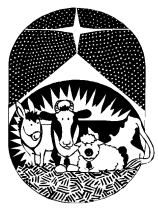OLD CHRISTMAS EVE

By Bill Baker
OLD CHRISTMAS EVE
By Bill Baker
"On the Twelfth Day of Christmas, my true love gave to me…..
We have all heard that song, the Twelve Days of Christmas. We all probably sang it in school at one time or another. But, what does that actually mean... the Twelve Days of Christmas? Where does that come from anyway? And, what special significance does the Twelfth Day have?
Nowadays, our primary concern seems to be with Christmas Eve and Christmas Day. But our mountain ancestors, who studied with great attention, every detail of the Bible, the almanac, and the calendar, understood the Twelfth Day very well.
Twelve days after Christmas Day, December 25, twelve days after the birth of Christ, is January 6, the Day of Epiphany. Epiphany is a Greek word that means "appearance". The night preceding January 6 is the Eve of Epiphany. Most Western-Christian faiths believe that it was upon this night over 2000 years ago that the Three Wise Men came to Bethlehem to look upon the infant Jesus. Therefore, the Twelfth Day of Christmas is the commemoration of the day upon which Jesus appeared to the Gentiles, as Christ the Savior.
The observance of Epiphany actually goes back farther than the observance of Christmas. It was known to have been celebrated before 194 AD, while the observance of the Nativity, in the form of Christmas, did not actually catch on until the 4th century AD.
The Scotch-Irish pioneers who settled in the deep hollows and rugged hills of the Appalachian Mountains carried on with many Old World traditions that harkened back into the Middle Ages. While some of those traditions and beliefs might seem rather like superstitions to others, they were held by a devout majority whose very survival and well-being could be accredited to their observance of each and every detail of their surroundings... whether it be the height of a hornet nest, the date of a killing frost, the place in the woods where some rare herb grew, or, an arcane bit of Scripture printed upon the yellowed pages of an old family Bible.
Mountain people knew the Day of Epiphany as "Old Christmas". One of their beliefs concerning the Day of Epiphany was that a person should never lend anything to anybody on Old Christmas Day, because the lender would never get it back. Also, they regarded the Eve of Epiphany as a night when the Holy Spirit would manifest Itself upon the earth in many subtle ways. Upon that night, mountain folk believed, that no matter how hard the ground was frozen ... elder bushes would sprout up out of the ground. But, even stranger than that ...
Our mountain ancestors believed that if a person would stay awake until almost midnight on old Christmas Eve, then sneak quietly out to a barn or a field where any cattle or sheep were kept, they could hear the animals pray. Supposedly, at the exact stroke of midnight on Old Christmas Eve, the animals would start moo-ing and baa-ing and bellowing... not in their normal way, but almost like they were crying. This belief undoubtedly harkened back to the stable in Bethlehem, and to the animals that were present when the Christ Child was revealed to the Magi.
Today, hardly anyone knows of Old Christmas. But, the elder bushes and the animals of the barn and field have surely not forgotten... should anyone like to find out for themselves, on Old Christmas Eve.
Home...The Tellico Plains Mountain Press